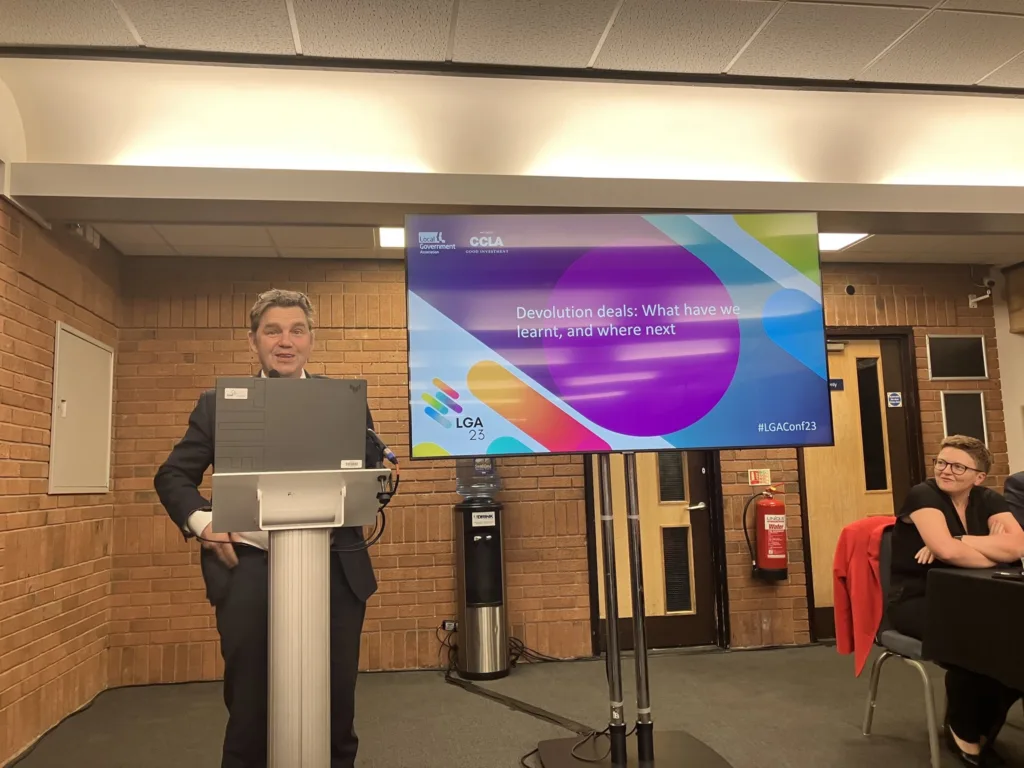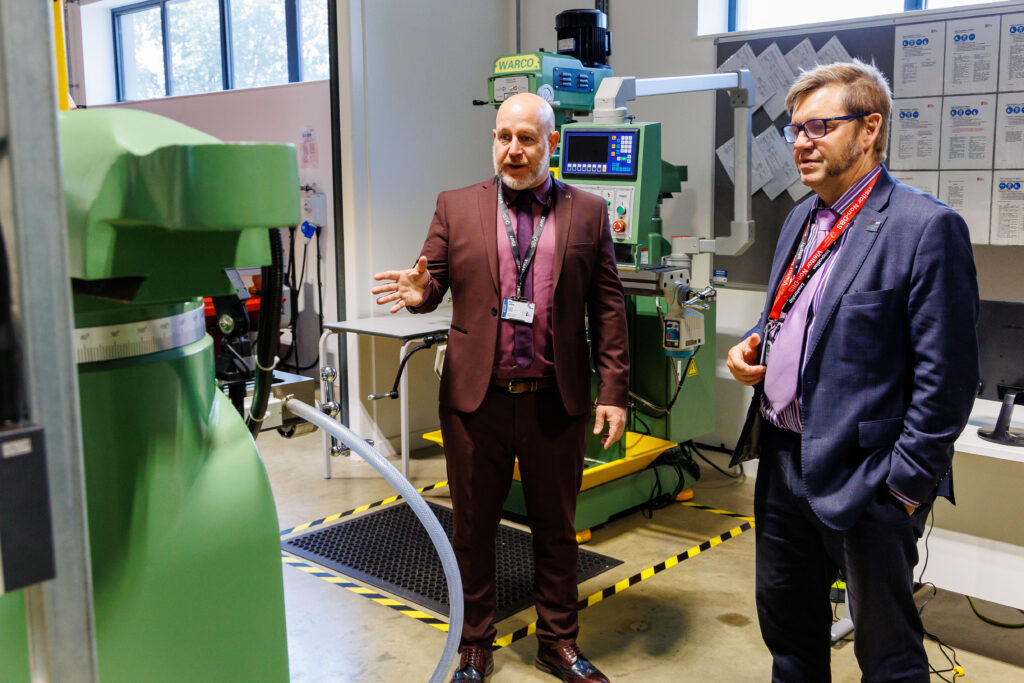One politician not disappointed seemingly by the withdrawal of a devolution deal for Norfolk and Suffolk is James Palmer, former Mayor of the devolved Cambridgeshire and Peterborough Combined Authority. Mr Palmer, who now heads a think tank, The Eastern Powerhouse, which campaigns for investment in the East of England, is on record for attacking former Tory minister Michael Gove’s proposals for Norfolk and Suffolk as ‘puppet devolution’.
In December 2022 and in an opinion piece in City AM, London’s business newspaper, he urged Michael Gove “to scrap the devolution deals he has offered to Norfolk and Suffolk and deliver a deal for each that is truly devolutional.
“Central government simply must think outside the traditional box,” he wrote. “In the East, for example, this means allowing business rate retention for a devolved region; allow the elected Mayors to make decisions without having to consult civil servants in Whitehall.
“This is our chance for real devolution in the UK, not the puppet devolution currently being offered to Norfolk and Suffolk.
“Michael Gove’s offer is the same as the deal that has failed to deliver in Cambridgeshire, Bristol, Birmingham, Manchester and Liverpool.
He added: “He is still seen by many as a great reformer; and the reputation is not unearned. And here, he has the chance to do something truly great by facing down his civil servants and actually devolving power from Whitehall.”
Mr Palmer also called for giving devolved authorities greater fiscal control and autonomy from Whitehall.
And he was mystified by the decision of council leaders in Norfolk and Suffolk to not want a directly elected mayor.
“Local politicians should embrace, not shy away from, the prospect of having an elected Mayor,” he wrote in City AM.

“Mayors can challenge, and they can reform, and critically they can deliver for their local area in ways that central government is often unable to. If, of course, the devolution deal is written correctly.
“As a former Mayor and local politician, I know that if you want to make a difference to your local community, and if you want to improve the place where you live, then local, not national, politics is the route you need to go down”.
Mr Palmer said that as “one of the few people in the UK to have held office as an elected ‘metro’ mayor, I know the pitfalls that will confront new elected leaders in both counties.
“They will not have the powers they believed they were being given. It is more likely they will become a plaything of government and, more particularly, the civil service.
“In short, what we have in the UK, certainly England, is a devolution sham.
“Each devolution deal is a smoke and mirrors exercise, devised by civil servants to give the illusion of local autonomy while maintaining a firm grip on the process from the safety of Whitehall.”
To understand the devolution issue in East Anglia, you need to go back several years to the original concept when Cambridgeshire and Peterborough opted for a go it alone stance, leaving Norfolk and Suffolk to sort it out for themselves.

They never did, always preferring to retain a leader instead of an elected mayor which hampered and delayed progress.
Eventually the Tories agreed devolution need not necessarily mean a directly elected mayor and so the seeds were sown for a new approach for both counties.
Indeed, not only were the Tory leaders of both Norfolk and Suffolk county councils anticipating the new set up, but they had also pencilled in next May for newly directly elected leaders of both counties.
An in-principle devolution deal was agreed last December but this week came the news that Labour has halted it.
Norfolk County Council leader Cllr Kay Mason Billig said: “I am bitterly disappointed that the new Government has halted our deal.
“Ministers don’t support the idea of a Norfolk-only deal, or the idea of a county council leader, elected by the public – even though this would not have involved additional bureaucracy.
“For a Government that is keen on economic growth, this is a short sighted and damaging decision.
“The Government says it supports devolution, yet it has killed off a deal that was ready to go: a deal that was going to improve lives in Norfolk and grow our economy and start to address decades of historic under investment in our county.

“Norfolk deserves better than this. I intend to press the Government for talks on how we can salvage as many benefits as possible from our current deal – and ensure we don’t go to the back of the queue for new powers and funding.”
The deal Norfolk had agreed with the previous Government proposed investment of more than £600m over 30 years. It would have enabled Norfolk to invest in areas such as transport, skills and job opportunities, housing and regeneration, tailored to the needs of local people.
But the new Labour government believes the deals for Norfolk and Suffolk did not go far enough and lacked ambition.
A spokesperson for the Ministry of Housing, Communities and Local Government said: “This government strongly believes that mayors should have a unique role, while council leaders must continue to focus on the delivery of the essential services.
“We want to see those two functions kept separate as this benefits the community and its people, which is why we will not be proceeding with the Single Local Authority mayoral deals proposed in Norfolk and Suffolk.
As Metro Mayors we are already passionate about local government
A week ago we were talking about devolution at Downing Street , tomorrow we are all going to be hearing about that ambition for our local communities in the King’s Speech .pic.twitter.com/D6iDiBhWWs
— Mayor Dr Nik Johnson (@NikJohnsonCA) July 16, 2024
What next? Deputy Prime Minister Angela Rayner has council leaders without devolution, to “partner with the government to deliver the most ambitious programme of devolution this country has ever seen”.
She insisted devolution is central to the government’s mission to boost economic growth, but only around half of the people in England currently benefit from these arrangements.
“For too long, Westminster government has tightly gripped control and held back opportunities and potential for towns, cities, and villages across the country,” she said.
In one of her first moves she met with the Prime Minister and metro Mayors to have “proper, grown up conversations around economic growth, and how to deliver that through better housing, skills, and jobs for local people.
“I want to work with more places to help them use these enhanced powers and role – because I want to drive growth in every part of the country.

“For any area considering it, now is the time to take the plunge and speak to us about how we can work with you to transform your regions”.
She added: “Agreeing new devolution deals will mark a monumental shift of power away from Westminster into communities – giving those with skin in the game the power to make the best decisions for their people and make a difference to their lives.”
Devolution seems, therefore, a central plank of the Government’s ambitions for the regions.
The top-down, elected-mayor model of devolution is a Whitehall fetish. Never suitable for largely rural counties like Norfolk and Suffolk. True devolution would see a proportion of income-tax or VAT receipts granted plus greater local revenue-raising powers.
— Zigurds Kronbergs #IStandWithUkraine (@ZGKronbergs) September 12, 2024
Suffolk County Council leader Matthew Hicks remains underwhelmed by the promises of Ms Rayner.
He told the EADT newspaper that withdrawal of the devolution deal for Suffolk “feels like a real slap in the face from a Government that won’t listen to what local people are saying.
“First, they waved through the Sunnica application, showing little regard for the communities affected.
Labour approve 2,500 acre Sunnica solar farm on Cambridgeshire/Suffolk border
“Then, they scrapped the winter fuel payments, which will adversely affect older people living in rural areas.
“Now, our proposed devolution deal – which has widespread public support – is in the bin.
“Governments of any colour should be pro devolution because councils know how best to serve local people”.
Green councillor Andrew Stringer, who heads a group including Liberal Democrats and Independent councillors on Suffolk County Council, is not too unhappy, however.

“This devolution proposal only ever really had the backing of the Conservative councillors,” he said.
A view shared by Cllr Cliff Waterman, leader of West Suffolk Council who described the in-principle deal as “very weak’ form of devolution, telling his local paper that “if it was a cup of tea it would be a weak brew.
“The point is it wasn’t a good offer”.
Norfolk and Suffolk lost out in 2017 when they turned down devolution. Their reincarnation of 'devolution lite' was always a non starter under Labour. Especially without directly elected Mayor. https://t.co/5YnSxhg92j
— John Elworthy (@johnelworthy) September 12, 2024
Alice Macdonald, Labour and Co-operative MP for Norwich North, is ready for the next ‘brew up’ to consider devolution.
“I want the best possible deal for Norfolk,” she tweeted.
“I believe we can do better than what was on the table under the last government.
“Labour is serious about proper devolution with an ambitious deal that will maximise Norfolk’s full potential and ensure our voice is heard.”
You can read James Palmer’s full article in CityAM here:
UPDATE
Late this afternoon Mr Palmer issued a fresh statement on the Norfolk/Suffolk devolution proposals. It is quoted in its entirety.
Devolution deals for Norfolk and Suffolk have been scrapped, followed by the inevitable anger from some and no doubt relief from others, writes JAMES PALMER
As a former Mayor who is neither from Suffolk or Norfolk, it always seemed to me that the county-based devolution deals lacked ambition and were actually a poor deal for the residents and businesses of East Anglia.
The new government has decided that a fresh approach is needed, a directly elected Mayor who can be more independent and slightly removed from party politics, and I think this is the right way forward.
Change in local government is always difficult. Councillors are often bewilderingly loyal to their particular authority, sometimes forgetting that they are elected to serve the people rather than the council.
Make no mistake, devolution is local government reform by the back door. And there is always opposition to reform.
I believe the scrapping of these deals offers a huge opportunity for the East of England, a chance to really put the region on the map. In 2016 there was a devolution deal on the table for Norfolk, Suffolk and Cambridgeshire.
I was part of those negotiations and the failure to sign off on that deal has negatively impacted our region ever since. The Cambridgeshire and Peterborough Combined Authority has been able to invest significantly into the Cambridgeshire economy, but it is difficult for the region, with just one Mayor, to make its voice heard against larger city-regions that have the ear of government.
Leaders in Norfolk and Suffolk should see the shelving of their deals as an opportunity to be bold and work together to forge a combined deal.
No business in the east operates purely on county lines.
In fact, Norfolk and Suffolk contains no less than seven different self-contained travel to work areas, that cross district and county.
Local authorities should look at how much stronger these local economies could be together with a single Mayor.
The east has always been overlooked by Westminster but by working together the councils of the region could and should put a deal to government that it would find difficult to turn down.
East Anglia is home to 2.5m people and tens of thousands of businesses. These are the ones who are missing out as local and central government fail to settle on a deal.
It is ten years since Greater Manchester agreed the first devolution deal. Every part of England, without a deal has fallen further behind.
A single Mayor for East Anglia would be a significant force for business and the economy and would offer a strong voice to government, one that would be very, very difficult to ignore.
The new government has a gargantuan majority and a whole swathe of new Labour MPs in the East of England.
I hope that they are bold when they return with new deals for Norfolk and Suffolk and other parts of the region.
I also hope that the political leaders in the east can look beyond party politics and their loyalties to their individual councils and work together to present a devolution deal for the people and businesses of this great region.
We deserve it.



























